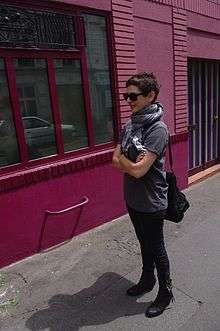Kate Zambreno

Kate Zambreno (born 1977) is an American writer. She is the author of the novella O Fallen Angel, winner of the "Undoing the Novel—First Book Contest," originally published by Chiasmus Press,[1] as well as the novel Green Girl, published by Harper Perennial.[2] O Fallen Angel will be reissued by Harper Perennial in 2017, and include an introduction by Lidia Yuknavitch.[3] Heroines, her "critical memoir" centered on the women of modernism, partially incubated on her blog Frances Farmer is My Sister, was published by Semiotext(e)'s Active Agents, edited by Chris Kraus. A chapbook, Apoplexia, Toxic Shock, & Toilet Bowl: Some Notes on Why I Write was released as part of the Guillotine series in 2013.[4]
Critical reception
Of her debut novella, O Fallen Angel, Michael Schaub at Bookslut wrote: "So enter Kate Zambreno, who is as much Acker as she is Woolf, as much Angela Carter as she is Elfriede Jelinek. (These are the four names most closely associated with Zambreno, and with good reason - it's almost impossible to read O Fallen Angel, her brilliant 2010 novel, without thinking of Zambreno as a perfected synthesis, but a wholly original one, of all four of those authors.)"[5]
Of Green Girl, James Greer at Bookforum wrote "The book is by turns bildungsroman, sociological study, deconstruction, polemic, and live-streamed dialogue with Jean Rhys, Clarice Lispector, Simone de Beauvoir, Virginia Woolf, the Bible, Roland Barthes, and most of Western European modernism by way of Walter Benjamin’s Arcades Project."[6] Elissa Schapell at Vanity Fair wrote "I can’t recall the last time I read a book whose heroine infuriated and seduced me as completely as Kate Zambreno’s Green Girl."[7]
Jezebel, which also in June 2012 named Zambreno one of "The Jezebel 25: Kick-Ass and Amazing Women We Love"[8] wrote of Heroines: "The book is startlingly insightful."[9] The Paris Review wrote: "With equal parts unabashed pathos and exceptional intelligence, Heroines foregrounds female subjectivity to produce an impressive and original work that examines the suppression of various female modernists in relation to Zambreno’s own complicated position as a writer and a wife."[1] Zambreno is also credited with adopting a novel approach to criticism in Heroines. According to Roxane Gay, "Her criticism rises from emotion. It is appealing to see a writer so plainly locate the motivations behind her criticism. All too often, criticism is treated rather antiseptically under the auspices of objectivity. There is no such distance in Heroines. Zambreno revels in subjectivity."[10]
Bibliography
- O Fallen Angel, Chiasmus Press, 2009.
- Heroines, Semiotext(e), MIT Press, 2012.
- Apoplexia, toxic shock, and toilet bowl : some notes on why I write, Guillotine, 2013.
- Green Girl, Harper Perennial, 2014.
- O Fallen Angel, Harper Perennial, 2017.
References
- 1 2 Higgs, Christopher (October 22, 2012). "Heroine Worship: Talking with Kate Zambreno". The Paris Review. Retrieved November 26, 2012.
- ↑ "Green Girl by Kate Zambreno". HarperCollins Publishers. Retrieved February 27, 2014.
- ↑ "O Fallen Angel by Kate Zambreno". HarperCollins Publishers. Retrieved September 13, 2016.
- ↑ Guillotine: A Series of Erratically Published Chapbooks Focused on Revolutionary Nonfiction
- ↑ Schaub, Michael (January 2011). "O Fallen Angel". Bookslut. Retrieved November 26, 2012.
- ↑ Greer, James (December 2011 – January 2012). "Everything is Cinema". Bookforum.
- ↑ Schappell, Elissa. "Fast Girls". Vanity Fair. Retrieved November 26, 2012.
- ↑ "The Jezebel 25: Kick-Ass and Amazing Women We Love". Jezebel. Gawker Media. Retrieved November 26, 2012.
- ↑ Sauers, Jenna. "Books You Should Read: Heroines". Jezebel. Gawker Media. Retrieved November 26, 2012.
- ↑ Gay, Roxane. "How We All Lose". The Rumpus. Retrieved November 27, 2014.
External links
- Interview with Sheila Heti for The Believer
- Interview in the New Inquiry
- Interview with the Daily Beast